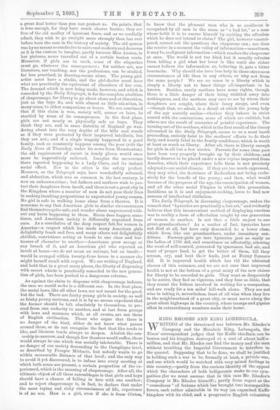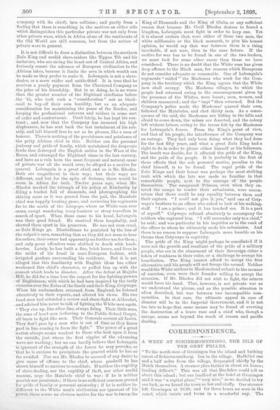KING RHODES AND KING LOBENGULA.
WRITING of the threatened war between Mr. Rhodes', Company and the Matabele King, Lobengula, the Times' correspondent judges that the Kaffir chieftain can be beaten and his kingdom destroyed at a cost of about halta- million, and that Mr. Rhodes can find the money and the men without troubling the Imperial Government to interfere in the quarrel. Supposing that to be done, we shall be justified in holding such a war to be, formally at least, a private war, and one which would be watched with very mixed feelings in this country,—partly from the curious identity of the appeal which the characters of both belligerents make to our sym- pathies (for we must assume that in this ease Mr. Rhodes's Company is Mr. Rhodes himself);. partly from regret at the "cussedness" of fortune which has brought two inoompatible forces, each rather admirable in its way (an organised Kaffir kingdom with its chief, and a progressive English colonising campany with its chief), into collision ; and partly from a 'feeling that there is something in the motives on either side -which distinguishes this particular private war not only from 'other private wars, which in Africa alone of the continents of the Old World are still common, but from the nature of 'private wars in general.
It is not difficult to draw a distinction between the northern Zulu King and sordid slave-raiders like Tippoo Tib and his imitators, who are eating the heart out of Central Africa, and furiously resent the advance of European civilisation to the African lakes, because it limits the area in which wealth can be made as they prefer to make it. Lobengula is not a slave- -dealer, or a. mere raider and cattle-thief. It is true that he receives a yearly payment from the Chartered Company as the price of his friendship. But in so doing, he is no worse than the greater number of the Highland chieftains before -the '45, who took such a "consideration" not as black- .mail to buy-off their own hostility, but as an adequate consideration for maintaining the peace of the Border, and keeping the professional caterans and raiders in some sort of order and contentment. Until lately, he has kept his con- tract ; and now that the Company has incurred his high displeasure, he has sent back the last instalment of hie sub- sidy, and left himself free to act as he pleases, like a man of honour. There is nothing of the peevishness and petulance of -the petty African chief in this. Neither can the personal jealousy and pride of family, which maintained the desperate -feuds that destroyed the English nobles in the Wars of the . Roses, and estranged the Highland clans in the last century, and have as a rule been the most frequent and natural cause -of private war all the world over, be alleged as a motive for 'quarrel. Lobengula is a great chief, and so is Mr. Rhodes. Both are magnificent in their way ; but their ways are different, and but for the spite of fortune, there would be _ room in Africa for both. Twelve years ago, when Mr.
...Rhodes marked the triumph of his policy at Kimberley by 'filling a bucket full of diamonds, and photographing the shining mass as it was poured from the pail, the liatabele chief was happily hunting game, and reviewing his regiments far to the north of the Limpopo, where no White man ever came, except wandering ivory-hunters or stray travellers in • search of sport. When these came to his kraal, Lobengula • was their good friend. He received them hospitably, and -showed them sport in his preserves. He was not even cruel, as Zulu Kings go. Disobedience he punished by the loss of the culprit's ears, remarking that as they did not seem to hear his orders, their owner had apparently no further use for them ; • and only great offenders were clubbed to death with knob. kerries, Lately, he has built a fine, brick house, and lives in the midst of his kraal in semi-European fashion, with irrigated gardens surrounding his residence. Bat it is not alleged that this familiarity with English ideas has either weakened this chief's character, or puffed him up with the .conceit which leads to disaster. After the defeat at Majubs, Hill, he did for a time lose the respect for the fighting-powers of Englishmen, with which he had been inspired by the tardy • victories over the Zulus of the South and their King, Ce,tywayo. When his ambassadors returned from England, he listened attentively to their reports, and altered his views. His two head-men had attended a review and sham-fight at Aldershot, .and advised him never to talk of fighting the White men again. " They rise up, line after line, always firing. Their little eons, the sons of headsmen (referring to the Public School Corps), all learn to fight like men. Their Generals correct all faults. They don't pass by a man who is out of time as they dance past in line coming in from the fight." The power of a great -nation always seems weakest to those who look upon it from the outside, just where the first ripples of the advancing wave are washing ; but we can hardly believe that Lobengula is ignorant of the strength of the forces he may provoke, or that he is anxious to precipitate the quarrel which he has so far avoided. Nor can Mr. Rhodes be accused of any desire to give cause of offence to the chief, whose goodwill he has shown himself so anxious to conciliate. If neither the cupidity -of slave-dealing, nor the cupidity of theft, nor other sordid reasons, urge the Matabele chief to war; if he is neither peevish nor passionate; if there is no sufficient common ground 'for pride of family or personal animosity ; if he is neither in- different to the White man's civilisation nor ignorant of his sower, there seems no obvious motive for the war between the King of Diamonds and the King of Clubs, or any sufficient reason that because Mr. Cecil Rhodes desires to found a kingdom, Lobengula must fight in order to keep one. Yet it is almost certain that, were either of these two men, the white millionaire or the black monarch, to give his honest opinion, he would say that war between them is a thing inevitable, if not now, then in the near future. If the motive for war has to be found in one of the two leaders, we must look for some other cause than those we have considered, There is no doubt that the White man has given deep offence to the Black man, for reasons which Europeans do not consider adequate or reasonable. One of LobenguIa's regiments "raided" the Mashonas who work for the Com- pany in the territory which the King agrees that the White men shall occupy. The Mashona villages, to which the people had returned owing to the encouragement given by the presence of the Whites, were burnt; men, women, and children massacred; and the " impi "then returned. But the Company's police made the Mashonas' quarrel their own, followed the Mata,beles, and shot thirty men. As a conse- quence of the raid, the Mashonas are hiding in the hills and afraid to come down, the mines are deserted, and the colony left without labour, owing to the terror felt by the Mashonas for Lobengula's forces. From the King's point of view, and that of his people, the interference of the Company was an outrage. They had only been doing what they had done for the last fifty years, and what a great Zulu King had a right to do in order to please either himself or his followers. The insult was double, for it affected the pride of the King, and the pride of the people. It is probably in the first of these effects that the sole personal motive, peculiar to the chief himself, is to be found. The regal pride of the Zulu Kings and their house was perhaps the most striking trait with which the late war made us familiar in that remarkable people, next to the courage of' the people themselves. The conquered Princes, even when they en- tered the camps to tender their submission, were uncon- scious that there could be any equality between them and their captors. "I could not give it you," said one of Cety- wayo's brothers to an officer who asked to look at his walking- staff, "I am a prince ; and it has touched me. It is a part of myself." eetywayo refused absolutely to accompany the soldiers who captured him. "I will surrender only to a chief," he said; and was particular in his inquiries as to the rank of the officer to whom he ultimately made his submission. And there is no reason to suppose Lobengula more humble on his throne than Cetywa.yo in captivity.
The pride of the King might perhaps be conciliated if it were not the growth and resultant of the pride of a military people, who see in the abasement of their Sovereign either a token of weakness in their ruler, or a challenge to avenge his humiliation. The King cannot afford to accept the first alternative, and his people will not forego the second. Neither would the White settlers in Mashonaland submit to the menace of coercion, even were their founder willing to accept the situation. If Mr. Rhodes did not wish to fight, the miners would force his hand. That, however, is not private war as we understand the phrase, and as the possible situation is often described, but war between two incompatible com- munities. In that case, the ultimate appeal in case of disaster will be to the Imperial Government, and it is not too late to hope that some means may be found of averting the destruction of a brave race and a chief who, though a savage, seems not beyond the reach of reason and pacific dealing.



































 Previous page
Previous page